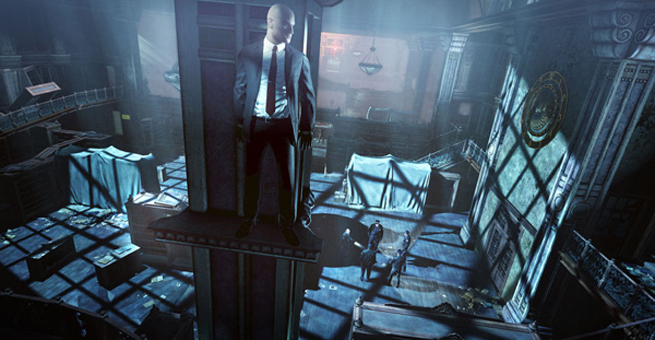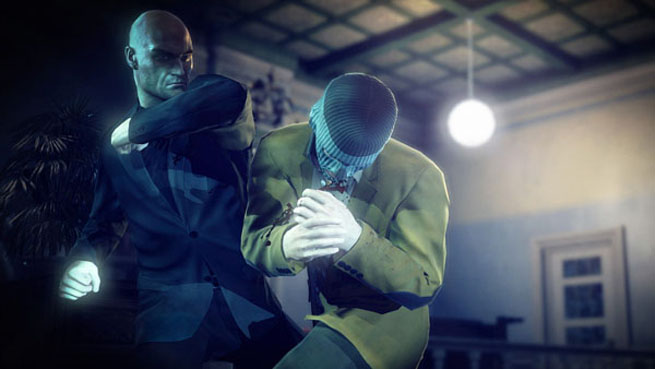WHAT YOU WON’T LIKE
What, me stealthy?
Agent 47’s ability to disguise himself in anyone’s clothes stands as one of Hitman’s signature features. It’s key to walking into areas you’re not supposed to be in without raising the alarm and walking out again unnoticed. The first Hitman game made disguises foolproof, and that felt unbalanced. Absolution swings way, way, way too far in the other direction.
Now disguises only effectively work at a distance. Get too close — this can be 10 feet or 200 feet — and guards instantly become suspicious. I can only guess that every cop and guard knows every other guard and cop in their department by sight. One even sniffed me out through a closed door. You must use Instinct (if you have any) to bluff your way past, or simply break the line-of-sight so they instantly forget you. Failing that, suspicion quickly spikes into an alert, and then you can kiss stealth goodbye. Once a disguise is blown, it’s blown across every area for the rest of the mission. You’ve got super-observant opposition with the best communication skills ever.
This makes it feel largely pointless to use disguises at all. Hitman: Blood Money made you fairly incognito unless you started acting out of character (or let your reputation get out of hand), but Absolution practically discourages a stealthy approach by making it so onerous. And of course, it punishes you for just shooting people. So much for playing any way you want.
Control issues
Hitman really needed a cover system three games ago. It didn’t need one that super-glues you to any flat surface and suddenly pops you out of shelter for no reason.
Meanwhile, Absolution shoves melee combat into the quick-time-event locker. Expect two standard button presses and one (of two) randomized finishers. It’s lazy, but it works unless your attacker comes at you from behind. Then the prompts happen off-screen, and you take the punch. Engaging in fisticuffs — which the AI can trigger as easily as you can — also locks you into those animations until somebody goes down. If your opponent has a few gun-toting buddies around, they help out by filling you full of lead, and you can’t do a damn thing about it.
The control map suffers generally from piling too many functions onto one contextual button. If a press-for-hint notification pops up, I might accidentally burn precious Instinct instead. Many’s the time I crept up on somebody expecting to perform a fast kill only to find myself mashing a button to choke my victim out while his friend shot me. Nope, you can’t cancel out of that, either. You can cancel out of picking a lock if somebody happens by, though. Let’s hear it for consistency.
It’s not very Hitman-ish
Despite a fairly long campaign, Absolution is surprisingly light on traditional Hitman-style assassinations. Those drop you in a tricky environment with a target or three to delete, then the game steps back to let you figure out the details on your own. This happens exactly three times out of 20 story chapters. And you can finish off 2/3rds of those in five minutes flat.
(Yes, you can spend more time finding more devious ways to foreclose on your victims, but I just can’t think of a good reason why such ridiculously shallow options exist at all.)
Otherwise, you spend the majority of the game traversing areas past scores of guards to reach the door to the next area. That’s Splinter Cell. When I play Hitman, I want to access an inaccessible target and quietly arrange their demise, but Absolution dangles that carrot at the very end of a very long tunnel. I frequently felt myself growing impatient trying to reach the actual mission, and that’s the death of a stealth game. Absolution relies heavily on the new Contracts mode, which splits out pieces of the campaign for create-a-hit challenges, to pick up the assassinating slack. I’m afraid that doesn’t excuse its near-absence in the primary mode.
The levels aren’t poorly designed, and indeed, later missions assign secondary targets to eliminate on your way from Point A to Point B. Those play very nicely indeed, but I spent way too much time in Absolution waiting to do what I really wanted to do. That’s never a good sign.
CONCLUSION
While it’s great to see 47 back in business, Hitman: Absolution drifts too far from the franchise’s sweet spot. A lengthy campaign offers plenty of opportunities for diabolical fun, but the stealth mechanics feel like a string of bad decisions, and a lack of pure assassination missions — exactly what the franchise built its fame on — doesn’t help. Most telling, this isn’t the Hitman I’ll revisit for years to dig out all its secrets. That honor stays with Blood Money. I like a lot of what it does and what it tries, but its faults make Absolution something I can’t quite forgive.
Score: 7.5
The publisher provided a non-retail copy of this game for the purpose of this review.
VentureBeat's mission is to be a digital town square for technical decision-makers to gain knowledge about transformative enterprise technology and transact. Learn More




